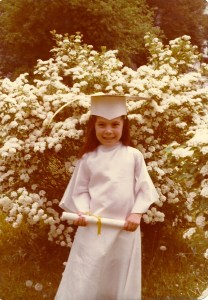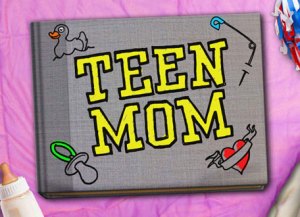My very first teacher was so pretty. She had long brown hair and blue eyes and sounded just like a Disney princess. Ms. N. never raised her voice and she made funny faces when she read stories. She tucked her straight hair behind her ears and after school I tried to perfect her look in my mom’s vanity mirror, but I could never get it just right. I was obsessed with being the teacher’s pet and eventually I think I was. Ms. N. cast me as the sun in the school play because she loved my smile. I wanted to be just like her when I grew up.
Ms. N. even had a wedding, right at school! All the girls and boys in the tiny Catholic preschool were paired up and asked to be flower girls and attendants. I wore a cream dress and gloves to look just like the bride. It was the best day of my four-year old life, but I knew what was going to happen next. Miss N was going to replace us with a baby of her very own!
But it didn’t happen. Ms. N. never had kids and she was the best teacher ever. She recently retired after forty years of teaching. Is it possible that her role as teacher was enough to fill her life with joy? Or was she sick of dealing with kids at the end of the day? For some reason I don’t think she ever tired of being around her students and is still involved in their lives today. I always wondered if she chose not to have kids or if she was unable to have them. Ms. N. and I are still friends and maybe someday she will tell me, but I will never ask.
It is because of Ms. N. and other teachers that I decided to teach little ones. I never thought that not having kids of my own mattered, but I think it made me a better teacher. Ms. N. influenced me in so many ways, but I can’t honestly say if I am copying more than Ms. N.’s hair style by not having kids.
Related articles
- Mommy Tips for Being an Effective teacher (kidsandmoms1.wordpress.com)
- http://whynokids.com/2011/03/22/dr-suess-didnt-have-kids/
- http://lauracarroll.com/2010/12/the-childfree-teacher-experience/
- http://www.thechildfreelife.com/index.php/viewpoints/180-why-do-i-need-a-child-when-i-already-have-100-kids




 Celebrities make it look so easy, with their
Celebrities make it look so easy, with their 










